Editor:
Brandon Sweet
University Communications
bulletin@uwaterloo.ca
Meet the School of Environment, Resources and Sustainability
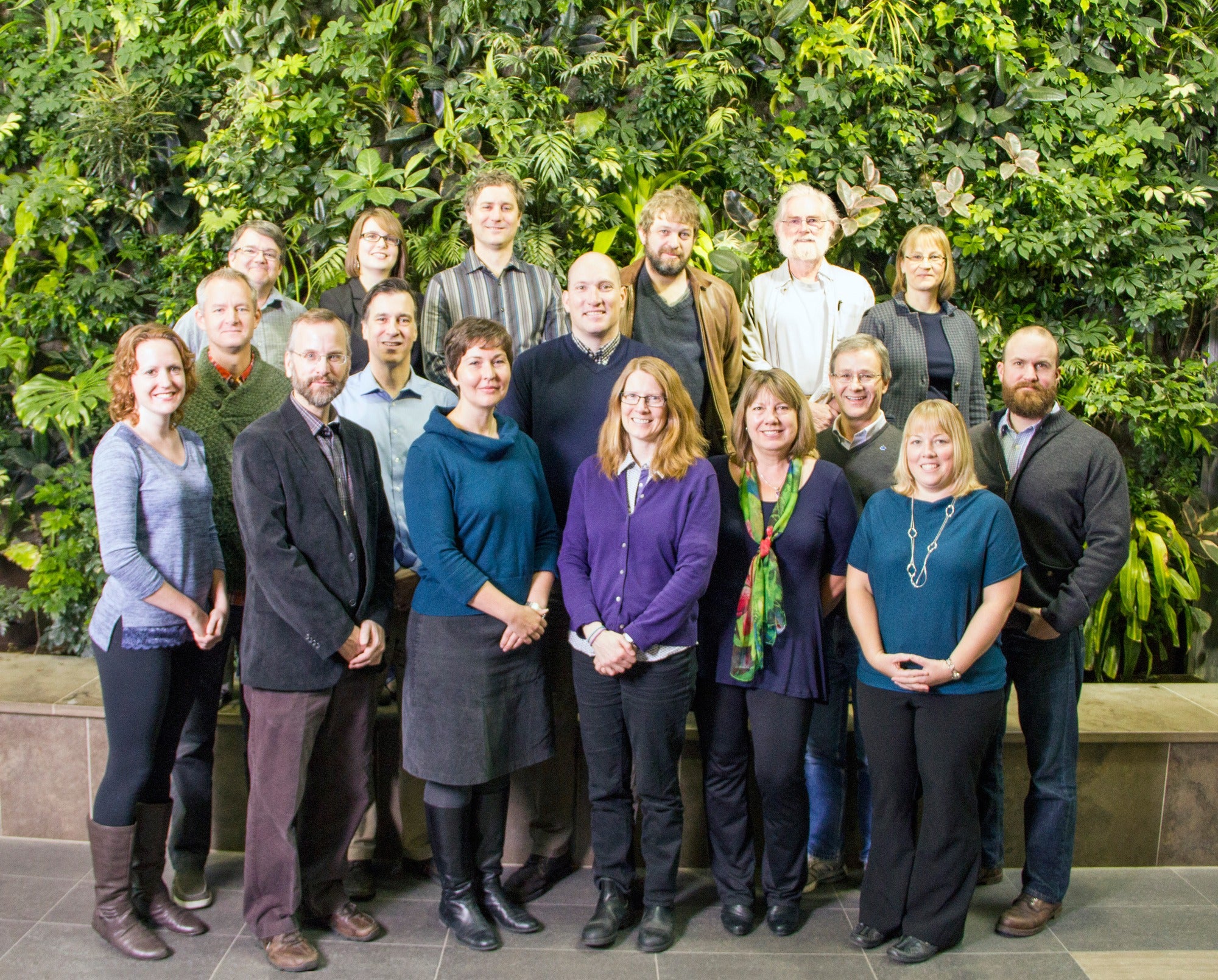
On January 1 of this year, the Department of Environment and Resource Studies in the Faculty of Environment officially became the School of Environment, Resources and Sustainability (SERS).
The change from department to school recognizes the evolution of an academic unit continually crossing disciplines to deliver transformational research and experiential learning opportunities for its students.
“Since its inception more than 40 years ago the Department of Environment and Resource Studies was never a traditional environmental science program,” said Jean Andrey, dean of the Faculty of Environment. “They have always embraced interdisciplinarity, straddling and crossing lines between natural and social science, and bringing the two together in ways that are relevant to addressing complex environmental issues. Becoming the School of Environment, Resources and Sustainability is the next step in that hard-earned progression.”
The name change aligns SERS with its academic peers across the country, thus sending a clear signal to prospective students and others about the comprehensive approach and opportunities available in SERS. It also enables SERS to communicate to prospective employers and students the full range of teaching, research and outreach in which they are involved.
With the designation as a school, SERS will also be better positioned to offer professional certifications or specializations such as environmental assessment and restoration. The School will also continue to leverage their commitment to experiential learning through its ecology labs, community-oriented projects, independent research and field courses.
From a branding perspective, the move from Environment and Resource Studies (ERS) to The School of Environment, Resources and Sustainability (SERS) signals its unwavering commitment to sustainability, while still benefitting from the ERS brand.
"We chose the term 'Sustainability' because this clearly articulates our long term mission and it is meaningful to all of our stakeholders,” said Stephen Murphy, Professor and Director of SERS. “There was a strong demand that we retain the focus on Resources as well as the eponymous term Environment. Combined, the name School of Environment, Resources and Sustainability avoids imprinting a single disciplinary focus on the unit."
The name change is the result of a two-year process of reflection and consultation with internal and external stakeholders. The process sought the advice of alumni, employers, current students (undergraduate and graduate), prospective students, faculty and staff.
For more information of the School of Environment, Resources and Sustainability and its new name, please contact SERS director Stephen Murphy at extension 35616 or by sending an e-mail to stephen.murphy@uwaterloo.ca.
Getting a handle on door bacteria
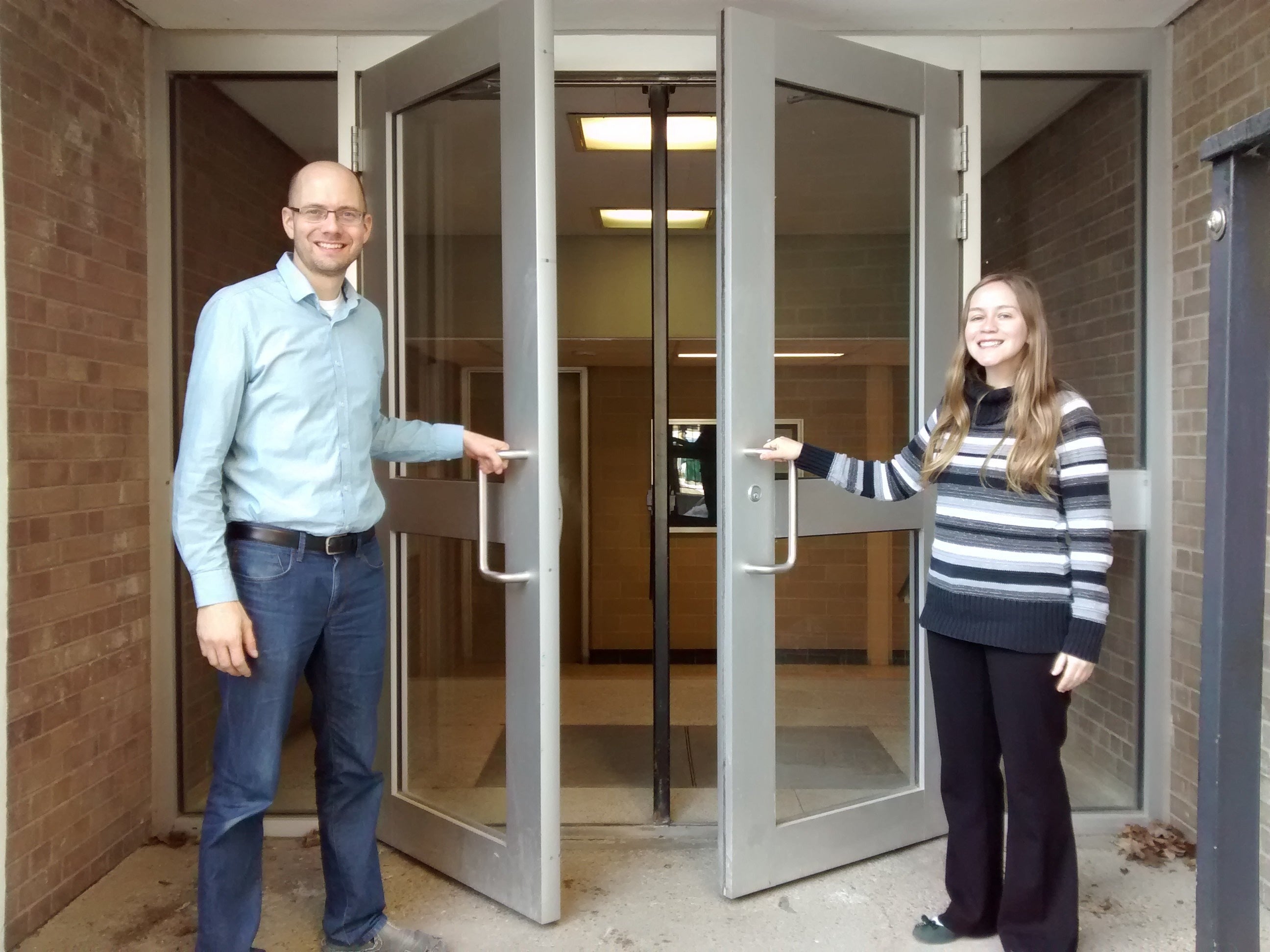
What's behind door handle number 1? Biology professor Josh Neufeld and graduate student Ashley Ross hold open the doors to Biology 1. A study of campus door handle bacteria reveals intriguing facts about the microbes we contact on a daily basis. Safe handling, everyone!
With more than 40,000 people passing through the University of Waterloo campus each day, this densely occupied built environment is the ideal place to study how humans interact with microorganisms.
Biology professor Josh Neufeld and graduate student Ashley Ross set out to study the distribution and taxonomy of bacteria and archaea on some the most touched surfaces on campus: building door handles.
Their study, recently published online in Microbiome, is the first of its kind showing our door handles are home to well-established, yet highly variable microbial communities. The sampling of 65 buildings revealed distinct door handle communities that depended largely on the building sampled and the number of people passing through the building.
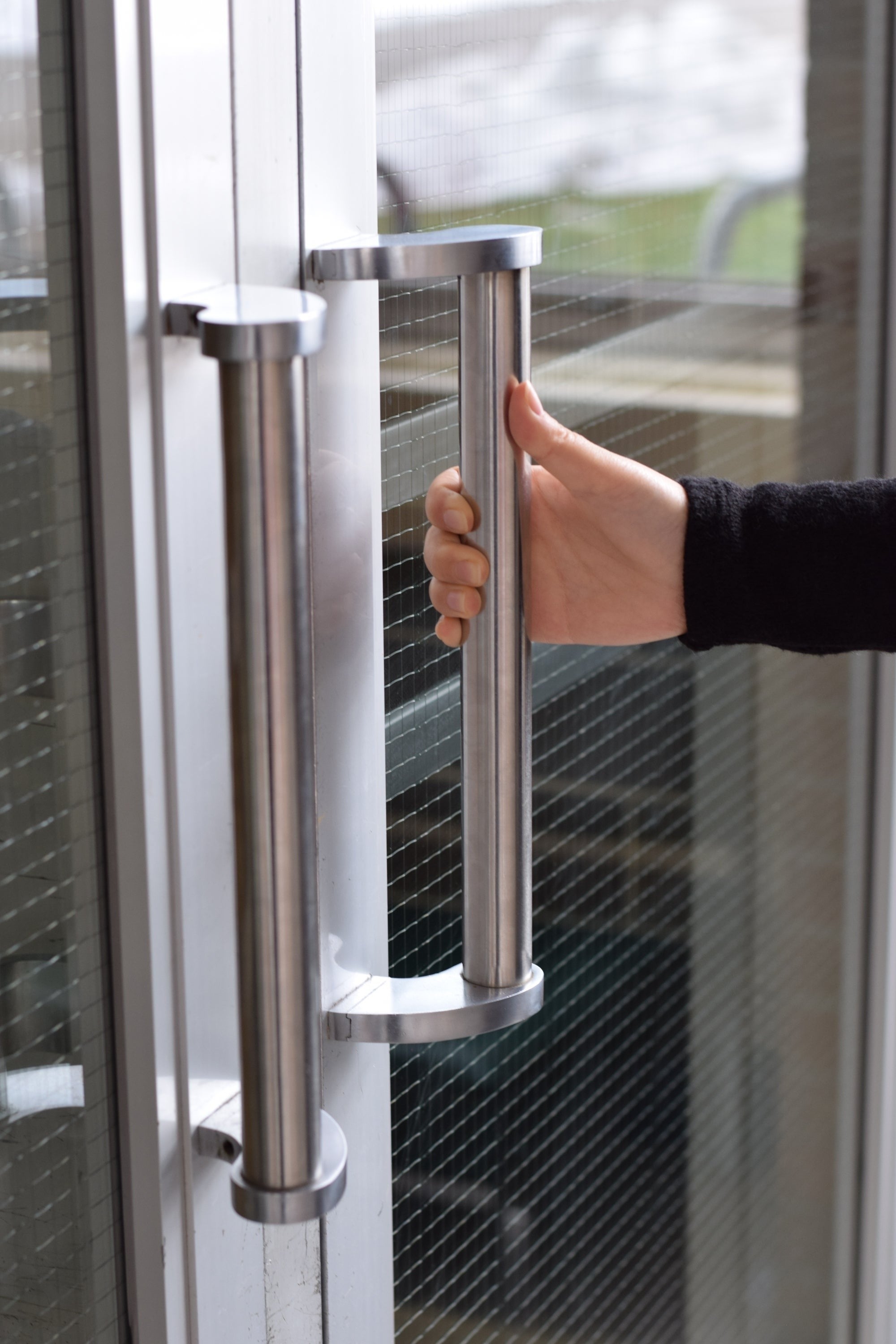
Waterloo’s lowest diversity door handles were found at the Tutor House (TH) student townhouses, whereas the most types of microorganisms were found on the door handles of the Physical Activities Complex (PAC). As expected, the PAC door handle diversity peaked during student convocation ceremonies, which also coincided with increased diversity on the Student Life Centre (SLC) door handles.
Understanding which microorganisms occupy surfaces of the built environments we occupy, and how they travel via human contact, are important steps toward improving public health, especially in highly populated environments like university campuses.
For example, it’s known that pathogenic bacteria can survive on metal surfaces for weeks. It’s also been found that students’ hand washing practices are poor and even vary depending on the type of building they’re in (low hand-washing rates in the recreational centre vs. higher rates in lecture halls).
“Learning more about the microorganisms that inhabit our buildings and our bodies provides important baseline information,” says Neufeld. “We’re hoping that this baseline will help those on campus maintain appropriate hygienic practices, in addition to assisting with built environment design considerations, ultimately for reducing the spread of illness.”
An important finding of this work was that door handles that are used more frequently tend to be distinct, microbially, from those that are touched infrequently. Specifically, Neufeld and Ross sampled visibly dirty door handles, which few people touch regularly. They found that these handles were home to distinct communities with a higher biomass and more biodiversity than visibly clean handles. These infrequently touched door handle also contained more species commonly found in soils, plant materials, and food.
The project was funded by a Discovery Grant from the National Science and Engineering Research Council of Canada (NSERC). Ashley Ross was supported by an NSERC Undergraduate Student Research Award (USRA) and a Canada Graduate Scholarship from the Canadian Institutes for Health Research (CIHR).
Saturday promises to be a Fantastic Day
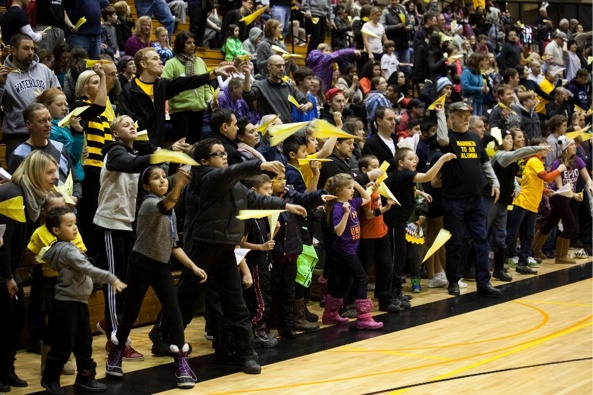
A message from Alumni Relations.
Fantastic Alumni, Faculty and Staff Day is coming to a gymnasium near you – with brand new bleachers! Alumni, faculty, staff and retirees are invited to come out and cheer on the Warriors basketball teams as they take on the Brock Badgers this Saturday, January 16.
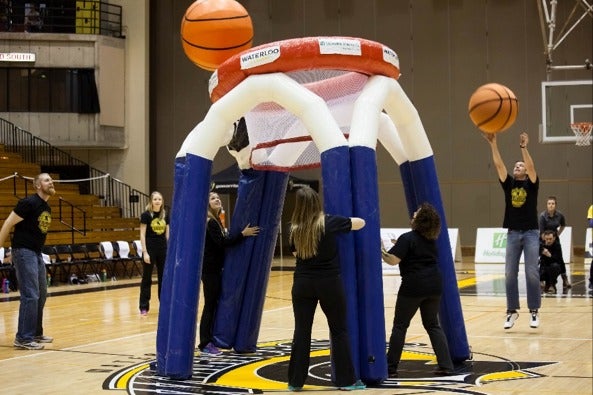
The day will feature women’s and men’s basketball, the Staff vs. Alumni Monster Hoops Showdown, and annual Airplane Toss for fantastic prizes. It’s the perfect way to spend the afternoon with your family and friends, so make sure to register and enjoy a day of Waterloo pride.
Go Warriors go!
Link of the day
25 years ago: Ric Flair fights Sting, becomes first WCW Heavyweight champ
When and where
Winter Welcome Week, Monday, January 11 to Friday, January 18.
CTE656: Getting Started in LEARN, Tuesday, January 12, 1:00 to 3:00 p.m., EV1 241.
Chemistry Department Seminar Series featuring Prof. Louis Barriault, Department of Chemistry and Biomolecular Sciences, University of Ottawa, “Development of New Photoredox Processes and Natural Product Synthesis”, Tuesday, January 12, 2:30 p.m., C2-361.
As the Women Sew: Community Quilts of Mampuján, Colombia opening reception, Tuesday, January 12, 7:00 p.m., Grebel Gallery, MSCU Centre for Peace Advancement.
Campus Life Fair, Wednesday, January 13, 11:00 a.m. to 2:00 p.m., Student Life Centre Great Hall.
CTE759: Designing Teaching and Learning Research, Wednesday, January 13, 11:30 a.m. to 1:30 p.m., Dana Porter Library.
Productive, sustainable writing practices, Wednesday, January 13, 3:00 p.m.
Clubs and Societies Days, Thursday, January 14, 11:00 a.m. to 6:00 p.m. and Friday, January 15, 10:00 a.m. to 4:00 p.m., Student Life Centre Great Hall.
CTE550: LEARN for TAs, Thursday, January 14, 2:00 to 4:00 p.m., EV1 241.
Movie Screening, “Code: Debugging the Gender Gap,” Thursday, January 14, 4:00 p.m., STC 0050.
Arriscraft Lecture Series featuring Pat Hanson, gh3, Thursday, January 14, 6:00 p.m., MLH-1001.
Course add period ends, Friday, January 15.
Knowledge Integration Seminar: Summer off? No — summer on! Friday, January 15, 2:30 p.m., AL 113.
UW Collaborates: A Crash Course in Collaboration, Saturday, January 16, 8:00 a.m., Environment 3.
Fantastic Alumni, Faculty and Staff Day, Saturday, January 16, 1:00 p.m.
CTE760: Enhancing Group Work, Sunday, January 17, 10:30 a.m. to 2:30 p.m., EV2 2069.
Upper Year Information Session for CS students, Monday, January 18, 3:30 p.m., DC 1304.
University Senate Meeting, Monday, January 18, 3:30 p.m., NH 3407.
CTE727: Using LEARN’s Rubric Feature, Tuesday, January 19, 10:00 to 11:30 a.m., EV1 241.
Biomaterial & Biomanufacturing Academic-Industry Forum, Tuesday, January 19, 2:30 p.m., QNC 1501.
Retirement celebration for Barb Rae-Schneider, Tuesday, January 19, 3:00 p.m. to 5:00 p.m., School of Pharmacy, 7th Floor (downtown Kitchener). Please RSVP by January 15.
Velocity Start: Science Talks, Tuesday, January 19, 7:30 p.m., South Campus Hall.
Velocity Start Program Kick-off, Wednesday, January 20, 5:00 p.m., South Campus Hall.
Author Event with John Ralston Saul, “The Comeback: Expanding the Circle,” Wednesday, January 20, 7:30 p.m., Humanities Theatre.
Velocity Start: How To Find Your Kick-A** Idea, Wednesday, January 20, 7:30 p.m., South Campus Hall.
C. Henry Smith Scholar Lecture featuring Dr. Rebecca Janzen, “Minorities in Mexico: Mennonites and the 21st Century State,” Wednesday, January 20, 7:30 p.m., Schlegel Community Education Room, Conrad Grebel University College.
Retirement reception for Tom Galloway, Thursday, January 21, 3:30 p.m., Federation Hall. RSVP to Jennifer Letson ext. 32934 or jletson@uwaterloo.ca
Drop, No Penalty Period ends, Thursday, January 22.
Roc, Tuesday, January 26, 12:00 p.m. PAS Room 2438
Water Institute WaterTalk Lecture by Sharad Lele, Thursday, January 28, 2:30 p.m., DC 1302.
Knowledge Integration Seminar: KI alumni panel "Life after KI", Friday, January 29, 2:30 p.m., AL 113.
Retirement reception for David Taylor, Friday, January 29, 3:30 p.m., University Club.
Bechtel Lecture Dinner with Dr. Janneken Smucker, “Abstract Art or Country Craft: The Quilts of the Amish,” Thursday, February 4, 6:30 p.m., Schlegel Community Education Room, Conrad Grebel University College. Contact Alison Enns (519) 885-0220 x 24217 or aenns@uwaterloo.ca for ticket information.
Board of Governors Meeting, Tuesday, February 2.
Job Fair, Wednesday, February 3, 10:00 a.m. to 3:30 p.m., Manulife Sportsplex, RIM Park.
FASS 2016, Thursday, February 4, 8:00 p.m., Friday, February 5, 7:00 p.m., 10:30 p.m., Saturday, February 6, 6:00 p.m., Humanities Theatre.
Bechtel Lecture featuring Dr. Janneken Smucker, “Unexpected Intersections: Amish, Mennonite, and Hmong Textiles and the Question of Authenticity,” Friday, February 5, 7:00 p.m., Great Hall, Conrad Grebel University College.
The Ritual of the Calling of an Engineer (aka the Iron Ring Ceremony), Saturday, February 6, 12:00 p.m., 1:00 p.m., 2:00 p.m. and 3:00 p.m., ML Theatre.
Communication for the Workplace, Thursday, February 11, 2:30 p.m.
Family Day holiday, Monday, February 15, most university operations closed.
Hagey Bonspiel, Saturday, February 20, 9:00 a.m., Ayr Curling Club.
Master of Taxation Open House, Saturday, February 27, 10:00 a.m., Downtown Toronto.